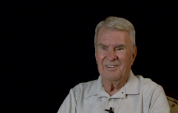3:47 | Korean civilians were filtering back into areas which had recently seen combat. Engineering officer Fred Culbreth engaged in a strange interplay with one farmer. Every day, his men would have to move a homemade irrigation line to work on a bridge and, every night, the farmer would rebuild it.
Keywords : Fred Culbreth engineer Korea bridge Korean civilian farmer Seoul Pusan

His father fought in WWI and he was too young for service in WWII. That may be why Fred Culbreth felt determined to attend a military school like the Citadel. He wanted the military experience but he didn't have a war. Then he got one in 1950.
Combat engineer Fred Culbreth was on a train rolling through Seoul toward the front. He had a support role but, within days of arriving at his post, he thought he may have to engage in combat in the middle of the night.
The lines were static during Fred Culbreth's time in Korea. There wasn't much movement in battle but the combat engineer was kept busy building and maintaining the many temporary bridges necessary to move men and materials around a country full of hills and rivers.
He never had to engage the enemy, but combat engineer Fred Culbreth did experience artillery barrages while working on gun emplacements in the Korean hills. He didn't know it at the time, but it damaged his hearing, as did his own rock blasting work.
Fred Culbreth had a great office for part of his time in Korea. He was snug in a cave carved out of solid rock. The combat engineer was good friends with the chaplain and they had a little routine that ensured they got plenty of steak dinners.
The combat group's headquarters area had a stage for USO shows and every time there was a show, the men stationed there got a little thrill that didn't involve showtime.
In an engineering unit, you had access to all kinds of things that other units needed and couldn't really get. Combat engineer Fred Culbreth made sure to collect plenty of plywood from his supply depots. You could get almost anything for plywood, including warmer boots, which were a big deal in Korea.
A bridge was washed out on his route, but Fred Culbreth didn't want to waste hours on the detour. He knew that there were rocks and a hand cable at a certain point, so he plotted a route on the map and headed for the spot. When he saw that the ford was flooded, he decided to go for it, anyway.